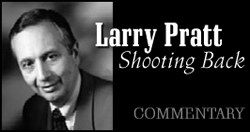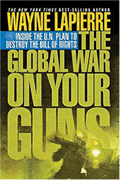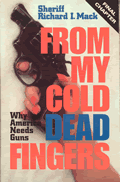Other Pratt Articles:
The Power to
Tax is The Power to
Destroy
BUSH JUSTICE DEPARTMENT: WHAT CONSTITUTION?
By Larry Pratt
February 9, 2008
NewsWithViews.com
The Solicitor General, Paul D. Clement, of the United States is the lawyer for the Justice Department. On January 11, Clement dropped a bomb designed to destroy the Second Amendment.
The bomb was a friend of the court brief that is a marvelous work of Newspeak as described by George Orwell in his novel of a horrifying future where words mean the opposite of their original definitions.
On the one hand, the brief argues that the Second Amendment protects an individual right to keep and bear arms that predated the creation of the U.S. government by the people. On the other hand, it concludes that any and all guns can be controlled or banned if a federal court finds that to be reasonable restriction or ban.
The brief asserts, with no proof whatsoever, that there is an "unquestionable threat to public safety that unrestricted private firearm possession would entail�." It is somewhat amazing that a brief in defense of the DC gun ban would say such a preposterous thing. It is the District of Columbia, with its gun ban, that usually has the highest murder rate of all U.S. jurisdictions. In high-gun-ownership jurisdictions such as neighboring Fairfax County, VA (with nearly twice the D.C. population), the murder rates are much lower. In Fairfax County it is more than 100 times less than the D.C. murder rate.
In some thirty pages of flip-flopping arguments, the Justice Department brief never once considered what the founders of the American republic might have meant by the phrase "shall not be infringed." But the Clement brief did criticize the idea that the Second Amendment was a categorical prohibition on banning guns.
The opinion of the DC Court of Appeals (DCCA) overthrew the DC handgun ban (and ban-by-trigger lock of long guns) on the grounds that the Second Amendment protects the individual right to keep and bear arms. This categorical view of the Amendment should be sent back to the Appeals Court for another look, according to Bush's brief. The Appeals Court should be told to look at the District�s gun ban in terms of what is "reasonable."
Nary a thought about what the founders meant, and thus what the Second Amendment requires. The law should be "developed incrementally" according to Clement � the living Constitution assertion that has been put forth to justify legislation by judges (i.e., lawlessness).
Clement's language is the language of tyrant's throughout history. He claims for the government the right to change the meaning of the law and the Constitution on a continuing basis � on a whim. This avoids the messy business of proposing and debating constitutional amendments. It so much tidier to have a small group of rulers emerge from behind closed doors to announce what the law is today, and what is illegal now that was legal a few minutes ago.
Clement, and most judges, have bought into an unconstitutional way of interpreting the Constitution that permits judges to consider various levels of scrutiny that are appropriate. Thus, they might decide (for reasons best known to themselves) that a higher level of scrutiny is required for interpreting a particular section of the Constitution. On the other hand, they might decide that a lesser standard of rational or reasonable of scrutiny is all that is needed.
When we hear judges talk about which level of scrutiny is appropriate in a particular case, the proper translation of the legal jargon is: "How far from the meaning of the Constitution can we get away with using?"
It is worth noting that the Second Amendment was written with the level of scrutiny appropriate for interpreting it, i.e., "shall not be infringed." That means that a discussion of the proper level of scrutiny, which is found in the Bush brief, and all other anti-gun briefs, is simply a coded discussion of the question: "What can we get away with this time?"
The Bush brief submitted by the Solicitor General was co-authored by Stephen Rubenstein, the head lawyer for the Bureau of Alcohol, Tobacco, Firearms and Explosives (BATFE). Not surprisingly, the brief expresses alarm that federal gun bans, licensing requirements, registration laws, import restrictions and other unconstitutional federal laws and regulations might topple if "shall not be infringed" is the required level of scrutiny.
In the Clement-Bush brief, the phrase "shall not be infringed" is never used. That is not surprising, since the game would be over if they did. It is so hard to say gun ban or licensing requirement in the same breath with "shall not be infringed."
D.C. v. Heller would not immediately result in such a happy situation. The case was designed to ease weak-kneed judges in a slow walk back to the Constitution. All that would happen if the decision of the DCCA were simply left standing is that DC would return to its pre-1976 law. And that law is about as bad as what one finds in New York City today. Heller does not face the judges with keeping a gun ban or erasing all the unconstitutional gun laws on the books. Of course, the Court could do that, but such an outcome would be quite surprising in view of the lowest common denominator that would be necessary for any kind of a favorable decision.
|
Subscribe to the NewsWithViews Daily News Alerts! |
Unhappily, the Bush brief makes it more likely than not that the Second Amendment will be gutted (unconstitutionally) by the Supreme Court. No wonder Rep. Virgil Goode (R-VA) is seeking to get his colleagues to co-sign his letter urging Bush to pull his brief. Those wishing to so urge their Representatives can click here then go and send an email with that request.
� 2008 Larry Pratt - All Rights Reserved
Sign Up For Free E-Mail Alerts
E-Mails are used strictly for NWVs alerts, not for sale
Larry Pratt has been Executive Director of Gun Owners of America for 27 years. GOA is a national membership organization of 300,000 Americans dedicated to promoting their second amendment freedom to keep and bear arms.
He published a book, Armed People Victorious, in 1990 and was editor of a book, Safeguarding Liberty: The Constitution & Militias, 1995. His latest book, On the Firing Line: Essays in the Defense of Liberty was published in 2001.
The GOA web site is: gunowners.org. Pratt's weekly talk show Live Fire is archived there at: www.gunowners.org/radio.htm
E-Mail: ldpratt@gunowners.org
Either Pratt or
another GOA spokesman is available for press interviews.
Unhappily, the Bush brief makes it more likely than not that the Second Amendment will be gutted (unconstitutionally) by the Supreme Court.












